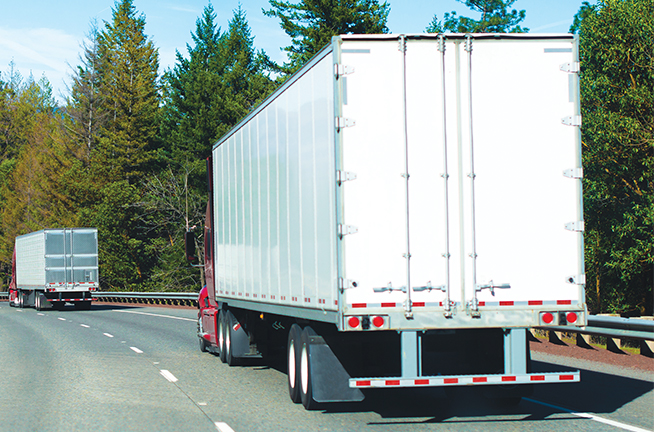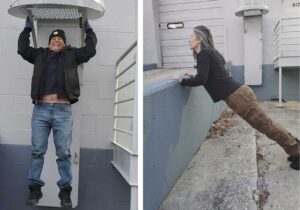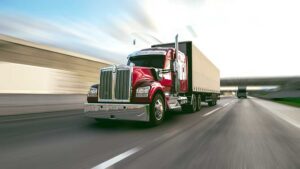You’ve carefully planned your trip and arrived without a hitch, remaining vigilant about safety. The trip went without a hitch and you’re ready to back up to the dock to unload. You get lined up and walk to the rear of the trailer to open the doors. You’re already thinking ahead to your next load, or maybe a little home time.
You remove the seal, move the door latches and ….
What happens next can depend on the process you follow. Far too often, the routine act of opening trailer doors results in driver injury and has caused death. The rear of the trailer is not a place to let down your guard.
If the load you picked up was a “drop and hook” load, always check the door hardware — hinges and latches — for cracks, missing bolts or other issues. Trailer doors are heavy and can cause damage and injury if they fall.
One problem inherent with enclosed trailers is that cargo can shift. Shippers and drivers have methods to help reduce cargo movement. Pallets are often shrink-wrapped and have bags, pallets or other objects placed between them to hold them in place. Rubber pads, straps and load-locks help stabilize freight.
For some loads, these measures are enough to prevent shifting. Some loads, however, seem to have a mind of their own. Road vibrations and the stresses exerted on the trailer while moving can cause freight to move, tumble and fall — all unseen until the doors are opened.
Just a single box of freight, if falling to the ground from near the top of the trailer, can be deadly. When there’s an avalanche of freight from a tipped pallet near the door, you may not be able to step out of the way in time, especially if you’re concentrating on watching where you walk or reseating the door latches so they don’t dangle.
Fallen freight can push against the back side of the door with enough force to push it open violently when the latches are loosened. You could be struck by the sharp edges or corners of the door, or you could simply be pushed backward hard enough to lose your balance and fall. That puts you on the ground — right where those heavy boxes are heading.
You can actually use the doors themselves as barriers against falling freight. By keeping the door between your body and the freight, you’ll have a shield that can knock down falling items, so they fall on the ground in front of you instead of on you.
Once one door is unlatched, position yourself behind the other door — the one that is still latched. Open the door a crack and look inside. If nothing is in danger of falling, go ahead and fully open the door, hooking the retention chain to hold it open. Some drivers use a bungee cord to help ensure that the door doesn’t come loose while backing in or from wind.
A flashlight makes it easier to check for fallen or shifted freight. Modern LED flashlights are inexpensive, and batteries last a long time. It’s a good idea to carry one when you’ll be opening doors.
With one door open, inspect the freight behind the other door. If it looks safe, open that door and hook it to its retaining chain.
Another consideration when opening trailer doors is wind. A trailer door has plenty of surface area for the wind to catch. That means the door can fly open or closed with enough force to knock a person down, or worse, hit the person, causing injury or death. Make sure you have a firm grip on the door so you aren’t surprised.
Roll-up doors, more commonly used for LTL and local freight, come with their own set of hazards. Most roll-up doors are assisted by a spring mechanism that helps make the door easier to lift. If the spring breaks or the mechanism fails, the door can close suddenly, damaging anything or anyone that gets in the way.
Roll-up doors also have more hinges and fastening devices that can rust or break, and they can come off of the roller system they are mounted on. When you open the door, check the cables for fraying or damage, and look for damaged or missing tracks, bolts or anything else that should be reported.
Some trailers are equipped with side doors. These need to be checked for proper operation, too.
Curtainside trailers are generally treated like an enclosed flatbed, but freight can shift unseen behind the curtains, so caution is needed opening these up as well.
Driver injuries can also happen because of parking lot hazards. Potholes, loose stones, trash or other objects can cause a trip or a twisted ankle. If you’re concentrating on safely opening the doors and looking for loose or falling freight, you might miss a ground-level obstacle.
The best practice is to inspect the area you’ll be walking on; then inspect door hinges and latches; then proceed to carefully open the doors, always keeping a door between yourself and the cargo. Keep a firm grip on the door until it is securely latched open.
When backing into the dock — or pulling out of one — be sure to look in both west coast mirrors. It’s easy to focus on the left mirror while backing, but brief looks in the right mirror will help you know if a door comes loose from its chain. Loose doors can cause damage to trailers and other vehicles or can be damaged by striking another trailer or even slamming shut.
If you see a door swinging freely, put on the parking brake, get out and secure it before proceeding.
There are enough hazards in trucking already, without the dangers involved with trailer doors. Following a safe process for opening and closing them, including keeping your footing secure, will help you stay healthy and ready for the rigors of the road.
Cliff Abbott is an experienced commercial vehicle driver and owner-operator who still holds a CDL in his home state of Alabama. In nearly 40 years in trucking, he’s been an instructor and trainer and has managed safety and recruiting operations for several carriers. Having never lost his love of the road, Cliff has written a book and hundreds of songs and has been writing for The Trucker for more than a decade.












Is there a check list or any sanctioned doc. that outlines the steps mentioned above?
We just had an incident where one trailer swing door was not restrained properly, the dock overhead door and the trailer swing door were both destroyed. Probable cause was faulty T-latch door hook, they are not very reliable anyway.